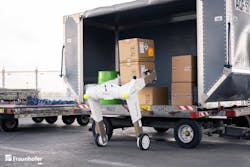Autonomous vehicles can play a significant role in streamlining and enhancing various airport operations, such as ground handling, in the near- and long-term future, according to officials at the Fraunhofer Institute for Material Flow and Logistics IML.
To demonstrate how autonomous mobile robots (AMRs) can contribute to efficiency, safety and flexibility in handling a wide range of tasks in the aviation industry, Fraunhofer representatives are working with leaders at Munich Airport (MUC) in Germany to serve various functions with its evoBOT.
evoBOT uses two wheels and gripper arms to move baggage and cargo while keeping itself perfectly balanced.
Fraunhofer demonstrated the autonomous robot’s versatility earlier this spring during a test run at Munich Airport and is working on further enhancements following the initial trial.
“Autonomous mobile robots like evoBOT can handle multiple tasks in ground handling, baggage handling and cargo handling,” say Fraunhofer’s Lars Mehrtens and Harald Sieke. “They can assist with various operations, including cargo transport, baggage loading and unloading and swiftly moving between different airport divisions.”
The evoBOT is capable of adaptive load pickup made possible by its arms. It can handle hazardous goods, transport parcels for longer recurring distances, relieve employees during lifting and overhead work, procure materials and provide support during the loading and unloading of aircraft.
The evoBOT can reach a maximum speed of up to 60 kilometers per hour and transport a load of up to 100 kilograms. It is able to operate both independently and with other evoBOT units.
The unit’s ability to maneuver effectively, allows the AMR to operate in a variety of environments indoors and out.
“Any automated support that reduces the physical strain on our colleagues is important, which is why future-oriented development must be driven forward as a matter of urgency,” adds Claudia Weidenbusch, managing director at Cargogate Munich Airport GmbH.
evoBOT’s Sneak Peek
The pre-test earlier this year was only for one day as a teaser for the full tests that are planned via the Digital Testbed Air Cargo (DTAC) research project at Munich Airport in April and May of 2024.
“There we will have 4 to 6 weeks to trial and evaluate the system(s) in multiple air cargo use-cases,” say Mehrtens and Sieke.
According to Fraunhofer, the one-day pre-test was intended to provide initial insights. The evoBOT operated within the Cargogate terminal and on the cargo apron at Munich Airport.
“The trial’s scope involved transport, handling and lifting (manipulation) of singular pieces within the airport’s cargo handling environment. This included standard packages but also less standard goods, such as barrels,” Sieke and Mehrtens explain.
Fraunhofer officials note the evoBOT performed as expected during its one-day trial.
“In general, all parties were content with the results and findings,” say Sieke and Mehrtens. “However, as this was not a full-fledged test with set key performance indicators (KPIs), it is challenging to identify specific features that exceeded expectations.”
Since the initial trial was not fully automated, the primary aim was to gain insights into driving behavior on the tarmac and cargo handling areas with real pieces of cargo, Fraunhofer’s representatives explain.
“The trial’s focus was on general airport and air cargo tasks, making it distinct from previous evaluations,” Mehrtens and Sieke say.
“We wanted to learn what evoBOT is capable of doing within the cargo handling environment and understand what future autonomous mobile robots can contribute to the air cargo system,” they say. “In general, the evoBOT team is working on funding a Fraunhofer start-up to expedite evoBOT’s time-to-market.”
More to Come
The evoBOT is still a research prototype and not a finished product, Sieke and Mehrtens point out.
“Therefore, improvements are needed such as customization for specific environments, incorporating safety sensors, navigation systems and ingress protection,” they say. “Also, enhancements to the chassis and suspensions for better performance on tarmac joints.”
Next year’s full tests of the evoBOT in April and May are planned with the support of the Digital Testbed Air Cargo (DTAC). The DTAC is focused on digital applications and solutions for the air cargo solution. The project’s goal is to make the air freight industry more efficient through digitally-based solutions.
In addition to Cargogate Munich Airport GmbH and Fraunhofer IML, the DTAC project consortium is comprised of nine other partners from research and industry. Research partners include CHI Deutschland Cargo Handling GmbH, Flughafen Köln/Bonn GmbH, Frankfurt University of Applied Sciences, Fraport AG Frankfurt Airport Services Worldwide, Lufthansa Cargo AG, LUG aircargo handling GmbH, Mitteldeutsche Flughafen AG, Schenker Deutschland AG and Sovereign Speed GmbH.
About the Author
Josh Smith
Editor
Josh Smith served as editor of Ground Support Worldwide as editor from 2016 through 2024. He oversaw production of the print magazine, created GSW's newsletters on a daily basis, and updated the latest news on AviationPros.com.

